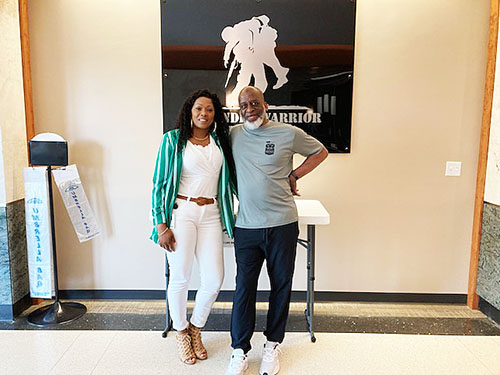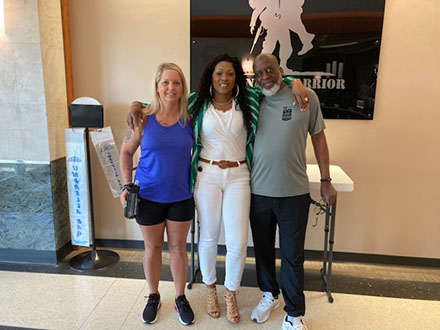A Lifeline in the Darkness: How a Simple Phone Call Saved a Veteran's Life

Chris Baylock wasn’t sure where to turn. Like many post-9/11 combat veterans, he’d seen a lot of things he couldn’t forget. For Chris, though, his most troubling and disturbing visions of war came from his experiences here in the States.
Chris was a career military man. He’d been an infantryman in the Army Reserves and was a technical sergeant in the Air Force. He’d been to Kuwait, Saudi Arabia, and deployed to Iraq during Operation Iraqi Freedom. But perhaps his toughest duty station – and where he saw and felt the greatest effects of war – was at an Air Force base in Dover, Delaware. The base is home to the Air Force Mortuary Affairs Operation where the remains of those killed overseas are sent.
“I felt heartbroken to see my brothers and sisters going home like that,” Chris said. Those images and the near-constant contact with death took a huge toll on Chris’ mental health. When he retired from military service in 2009, the horrors of what he witnessed went home with him.
“Everything inside of me was completely destroyed,” Chris said. “I could put on a smile, and say that I'm OK, but I was dead inside.”
During his darkest point, Chris realized things weren’t going to get better unless he got help. One day, he ran into someone who suggested he reach out to Wounded Warrior Project® (WWP). That call would change his life.
Breaking the Silence: Taking the First Step
WWP’s Resource Center is the first point of contact for warriors and their family members when reaching out to connect with any of WWP’s life-changing programs and services.
And, as in Chris’ case, it can save lives. When Chris contacted the Resource Center for help, he was connected to Peggy Collins, warrior support coordinator. Neither Chris nor Peggy knew at that moment what an impact they would make on each other’s lives, but that call got the ball rolling.
Chris reached out because he was in a dark place, but replacing the darkness with light takes time and effort. Peggy was determined to make that effort and get Chris to make it, too.
“When I got to talk with Peggy, I was in the darkest place I’ve ever been,” Chris said. “I had no will to live. I was so close to the edge, it was unbelievable, and when I first talked to Peggy, we talked about family, things in nature. She kind of distracted me from the PTSD.”
Peggy, a military family support member herself, immediately saw Chris needed serious help. She could sense his reluctance but wasn’t about to let him hang up without knowing that he wasn’t alone.
“When I originally talked to Chris, I could hear it in his voice,” Peggy said. “With the training, skills, and conversations I’ve had previously with other warriors who were in crisis, I was able to pick up on those cues, and I was able to help assist him.”
Peggy recalls Chris saying he didn’t know about tomorrow, so she just had him focus on today. What did he need right now?
“We had that tough conversation. I was able to listen to him, get his feedback, and give guidance on help to get him on the right track,” she said. “It comes down to just listening.
“Sometimes, he would shut down, and I would tell him, ‘Chris, we're not doing this today. I need you to talk to me. Tell me what's going on and let's get through this. So, he opened up and I was able to get him connected to many different programs. Since then, I felt like we built a relationship.”
The Resource Center assesses the needs of warriors, caregivers, and their families, and helps them get connected with WWP’s programs, services, and external resources.
Programs like WWP Talk and Peer Support groups can give warriors and their family members a safe place to share their thoughts and feelings. Peggy and the Resource Center are the first step in the process.
Where the Darkness Lives
As most combat veterans, like Chris, can tell you, the images of war are not something you forget.
But for Chris, it was his military job back in the U.S. that left him with the most demons.
The Air Force Mortuary Affairs Operation at Dover Air Force Base is responsible for receiving the remains of every service member killed overseas. It is the first place they return to, and the enormity of the loss weighs heavy on the brothers and sisters in arms who are tasked with working there.
“I don't know what it is to get shot at every day or bombed or anything, but I know the full effect of that on the human body,” Chris said.
At the time, Chris didn’t admit to anyone, not even himself, that he might be dealing with post-traumatic stress disorder (PTSD). He thought maybe it would eventually go away.
“I see it as a horrible thing now, but at that time I thought it was OK because I was going along, minding my business,” Chris said. “I was taking my meds and telling everyone I was OK, but that only makes the monster grow deeper inside you.”
Chris didn’t understand the toll it was taking on his mental health. He was shutting out those who cared about him, worrying that by seeking help, he’d become a burden on someone else.
“You try to hide it, and, for me, I didn't want to share anything with anybody because I didn’t want to make them feel the way I feel,” Chris said.
At one point, it got so bad, Chris decided he couldn’t take it anymore. He just wanted to make the images in his head disappear. That was the point when he began feeling the effects of all his deployments and feeling like he was letting his family down.
He wasn’t sure if he wanted to die or not, but he was haphazardly living life, drinking, hanging out at bars, masking what was really going on inside.
“That's where I was living life for a long time.”
A Light in the Tunnel
A few years ago, Chris was out when he saw a WWP van. He approached the driver and struck up a conversation. The person gave him a card and told him to call.
That call connected him to WWP – and Peggy. It would start him on the first step of a path toward living life on his own terms.

“Trying to improve something that you don't want people to know that you have is like living a secret life,” Chris said.
With Peggy’s help, Chris was able to get involved with Warrior Care Network®, which partners with four world-renowned medical centers to help treat symptoms of PTSD, traumatic brain injury, military sexual trauma, and more. Chris was able to spend two weeks in the Operation Mend Program at UCLA, and he said the experience was a game-changer when it came to his PTSD.
“Me and my therapist out there were able to really talk,” Chris said. “He even came in on one of the days off so he could continue to talk. He believed in me. I never really got a chance to talk or really explain how I was feeling to doctors before, and he gave me a lot of different options other than just a pill.
“That opened my heart up a lot more as far as accepting other things that could benefit me in my life.”
When it comes to warrior care, WWP also knows what a big part family support members and caregivers play in a veteran’s overall well-being.
For Chris, his caregiver, Courtney, helped him get out of the house and out of his head. She plays a vital role in making sure he takes his medicine, eats right, and gets some sleep. They were both dealing with different traumatic events, but the shared trauma helped unite them. Caregivers and family support members are a crucial component of a warrior’s overall well-being, and sometimes they need assistance in that role as well.
Peggy was also able to connect Courtney to services to better help her be there for Chris, as well as help she could get for herself.
“I told them about the different programs that she has access to and made sure that she knew what resources we had for both of them,” Peggy said. “She was super excited that I was able to help get him connected. We're not just here for the warrior, but we're here for the family support members and caregivers.”
Chris also got involved in WWP’s Physical Health and Wellness programs. Through this involvement, he ended up hundreds of miles from home and in tears.
Coming Full Circle
Earlier this year, Chris traveled from Pennsylvania to Jacksonville, Florida, for a physical health and wellness event. Peggy just so happens to work at WWP’s headquarters in Jacksonville. Although the two felt like they already knew each other so well, they would finally get to meet face to face.
“Even though I had tears down my face, it was all tears of joy,” Chris said about meeting Peggy in person. “She saved my life because I was close to calling it quits.”
Peggy knew how far Chris had come in his journey but was stunned to find out to what extent she had played in it.
“We just had a conversation and that's when he told me, ‘You know, you saved my life,’ and all I could do was just give him a hug,” Peggy said. “I know at Wounded Warrior Project, we're saving lives every day, but to actually meet someone who says you saved their life, it's an amazing experience.”
Chris hopes his story will encourage other veterans who are going through struggles or are in a dark place to reach out and accept help.
“I had to find my own self – to want to live for myself. I couldn't do it for somebody else,” he said. “It took me a while to truly find myself, and I could only find myself when I reached out to Wonder Warrior Project, and I met Peggy.”
WWP’s programs and services are designed to help warriors and their families at every step along the way of their journeys. No warrior should ever have to feel alone.
“We have so many different resources that can help,” Peggy said. “We want to give them hope so they know that this is not the end of the road. We are here.”
Find out more about WWP’s mental health programs.
Contact: — Paris Moulden, Public Relations, pmoulden@woundedwarriorproject.org, 904.570.7910
About Wounded Warrior Project
Since 2003, Wounded Warrior Project® (WWP) has been meeting the growing needs of warriors, their families, and caregivers — helping them achieve their highest ambition. Learn more.